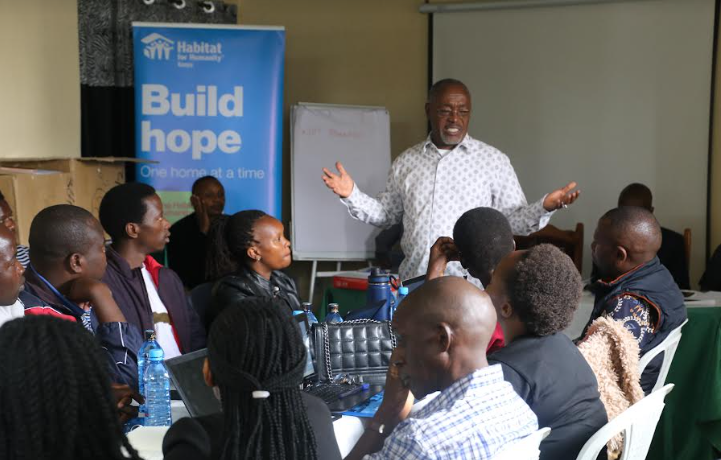
KNA by Ian Chepkuto
The Country Director of the Turing Trust Organisation Koome Kiragu has urged schools to fully embrace digital learning.
Kiragu underscored the importance of leveraging on technological resources in schools, to equip students with the necessary skills to tackle modern education challenges and prepare them for the future.
“The computer centres in your schools don’t just belong to the institution; they belong to you,” he noted, encouraging teachers and students to explore new ideas with the available technology.
He emphasized the importance of sharing knowledge, stating, “One of the virtues we must learn is giving and we should be ready to share what we know with others.”
Speaking during the conclusion of a three-day accelerated digital literacy training programme for teachers at a Nairobi hotel, the Director highlighted the transformative impact of the initiative, saying it has equipped educators with essential digital skills to enhance their teaching capabilities.
“This training aims to empower teachers to integrate technology into their classrooms, ultimately enriching the learning experience for students and preparing them for a digital future,” he said.
The three-year initiative, aimed at enhancing digital access in schools, is making significant strides.
Following a comprehensive assessment to identify schools eligible for computer access, the project successfully distributed and installed equipment.
Currently, the programme is focused on capacity building, with over 30 teachers from 40 schools receiving ICT training to empower them in utilising the new technology effectively, Kiragu said.
The next phase will concentrate on maintaining the refurbished computers and equipment, ensuring that schools can sustain their digital infrastructure long after the programme concludes he added.
Emphasizing the importance of integrating Information and Communication Technology (ICT) in both primary and secondary education, Kiragu, who was the chief guest noted that IT skills were essential in ensuring students were well-equipped to meet the demands of the digital age.
“By enhancing digital literacy among educators, we can create more engaging and effective learning environments that prepare students for future challenges and opportunities,” he added.
The Turing Trust Organisation, a key donor of the Digital Literacy programme for pupils in Kenyan schools, is a global charity dedicated to providing IT resources and training to schools across Africa, through implementing partner, Habitat for Humanity Kenya.
The programme focuses on ensuring that underprivileged children from rural settings gain access to technology and develop essential digital skills for their future, empowering them to thrive in a technology-driven world.
The Programmes Manager at Habitat for Humanity Kenya James Waithaka said the organisation is currently implementing the programme to enhance digital literacy among primary and secondary school students.
“The programme focuses on digital literacy for students in primary and secondary schools, aiming to enhance their capacity to utilise ICT and integrate it into the curriculum as an essential learning tool. We have successfully distributed 800 computers to more than 40 schools, benefiting approximately 15,000 pupils in the process,” he said.
Waithaka said the digital footprint created by the programme has had a ripple effect on every child trained and supported in acquiring skills.
“The organisation is exploring ways to enable the 40 equipped centres to open their doors to the community, allowing more individuals to gain digital skills,” he said.
He noted that the programme initially targeted key regions where Habitat for Humanity operates, including Machakos, Kisumu, Nairobi, Laikipia, and Homa Bay, but is now expanding to surrounding areas such as Kakamega and Kiambu.
The programme manager stated that “for schools to receive this support, they must have labs equipped with power, security and ICT resources. Habitat for Humanity Kenya will then equip these centres by installing workstations and LAN systems, as well as refurbishing Microsoft systems to ensure they are in compliance with current educational standards.”
The organisation is now capacity-building teachers with ICT skills to enhance their effectiveness in the classrooms. All trained teachers receive certificates.
Waithaka stated that they were working with the Ministry of Education, which is part of the programme committee, to influence the government to post teachers with ICT skills to technology labs.
“The goal of this initiative is to influence the government to post skilled ICT teachers in schools that already have established infrastructure. We have seen their significant commitment and support for these efforts,” he said.
“Another partner is Computers for Schools, which refurbishes used computers and supplies them to schools. They played a key role in assisting Habitat for Humanity Kenya in refurbishing 800 computers for educational institutions,” he added.
Waithaka urged students to take advantage of the opportunities presented by the digital space to enhance their skills.
“The best opportunities, requiring minimal capital, lie in the digital realm. We encourage our students to seize these chances to strengthen their foundational skills, as this is critical for their future educational success,” he said.










